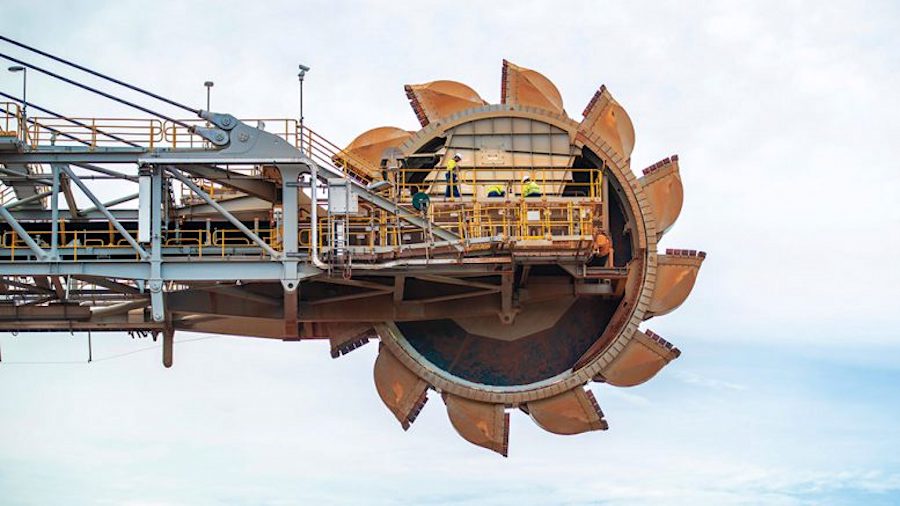Rio Tinto slashes dividend as profits take a hit; shares tumble

Rio Tinto reported a 29% drop in first-half profit and more than halved its dividend on Wednesday, as weaker iron ore prices due to cooling demand from top consumer China, higher costs and labour shortages hurt the global miner.
It is still the company’s second-highest interim payout ever, following on from the record payout dispensed last year when Rio’s profits benefited from a surge in commodity prices.
Since then, iron ore prices have come under pressure due to persistent demand worries from top steel producer China, with the country’s zero-covid policy curtailing economic activity and weighing on ferrous markets.
Mining companies around the world have also been struggling due to a pandemic-related shortage of skilled workers and surging inflation, at a time when iron ore prices have come off their 2021 highs and are expected to remain subdued.
“While the pricing environment is becoming more challenging, the demand outlook remains positive,” CEO Jakob Stausholm told a media briefing after the results.
“I always said it will take time to build a stronger Rio Tinto. It does,” he added.
Rio, one of the world’s top iron ore producers, posted an underlying profit of $8.63 billion for the six months ended June 30, compared with a record $12.17 billion a year earlier and analysts’ mean forecast compiled by the company for $8.37 billion.
The company more than halved its interim dividend to $2.67 per share from $5.61 per share a year earlier. The dividend for the first half equates to $4.3 billion and was still Rio’s second-highest interim payout ever.
The company also cut its capital investment forecast for 2022 by $500 million to $7.5 billion.
The drop in profits and dividends sent Rio’s shares tumbling more than 3% in London.
“We expect the declining trend in earnings and cash flow to continue in 2H with a trough not likely until 4Q,” Jefferies said in a note.
Citibank analysts said the market’s focus in the near term would be commentary around capital management, China’s demand outlook and iron ore shipments for the rest of the year.
China growth fears
Rio said its operations and growth projects continued to be impacted by the high unplanned absences, tight labour markets, rising input costs and supply chain disruptions.
Weakened demand in China and policy changes there have weighed heavily on sentiment in the iron ore sector.
Beijing last week revealed plans to centralize iron ore purchases, further clouding prospects for miners.
But Stausholm said he was optimistic about China in the medium term.
“China has more means to fix their economy and that includes sorting out challenges that they have faced recently in the property market. In the medium term … I am very optimistic that China will find solutions to the different parts of the economy …,” he told reporters in the media briefing.
Rio said talks were underway with the Guinea government, which ordered all work at the Simandou project – the world’s largest undeveloped iron ore deposit – to stop due to lack of progress between partners, also including a Chinese-backed consortium, to formalize a joint venture.
“This is a massive project (involving) quite a few stakeholders: several joint venture partners from China, ourselves and the government of Guinea. It’s not an easy negotiation,” Stausholm told investors after the results.
The need to secure new sources of metals for the energy transition remains a primary focus for the world’s largest listed miners including Rio, which is in the process of buying the Rincon lithium mine in Argentina. Lithium is in strong demand as a vital ingredient in batteries for electric cars.
The company in March put in a bid to buy the 49% of Canada’s Turquoise Hill TRQ.TO it does not already own for about $2.7 billion, paving the way for direct ownership of the massive Oyu Tolgoi copper-gold mining project in Mongolia.
“We put a lot of effort to offer shareholders a fully priced proposal … I reckon that the market has changed and copper is now trading lower … strategically I still think it’s the right thing to simplify TRQ,” Stausholm said.
(By Praveen Menon; Editing by Simon Cameron-Moore and Mark Potter)
{{ commodity.name }}
{{ post.title }}
{{ post.date }}




Comments